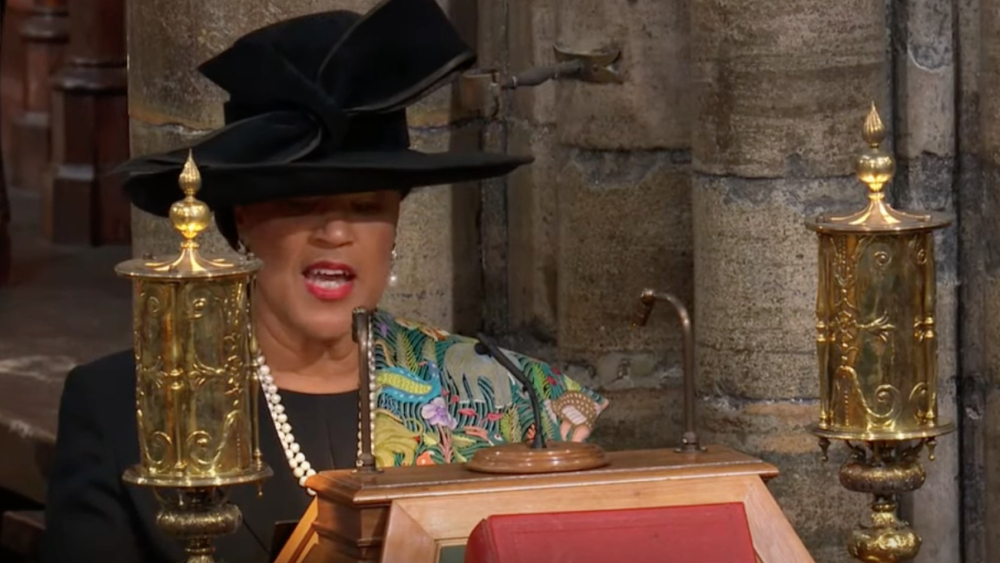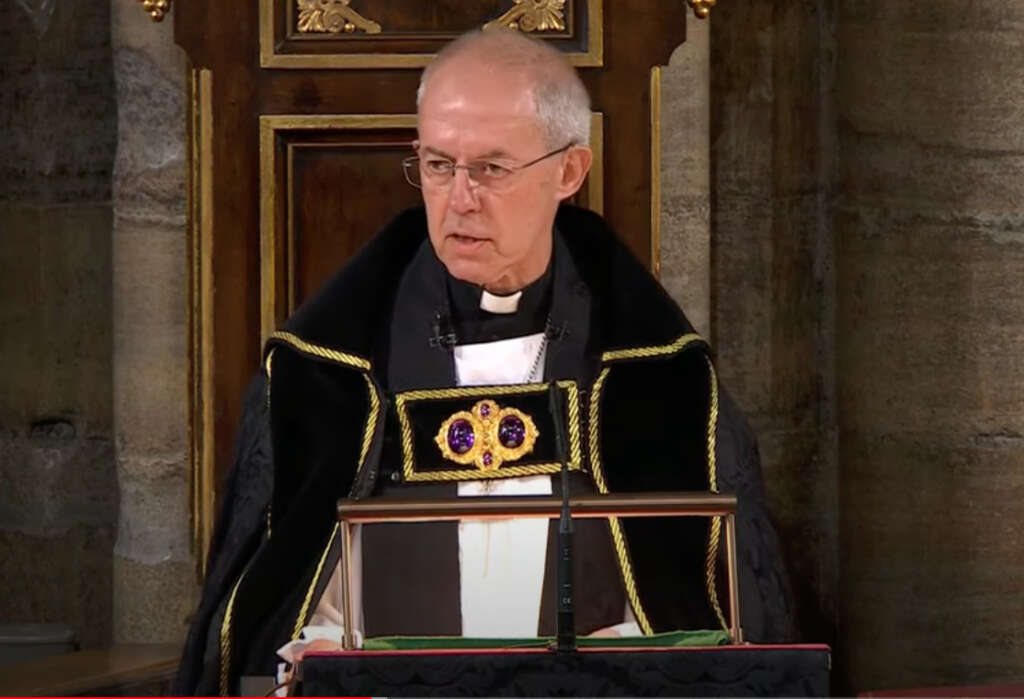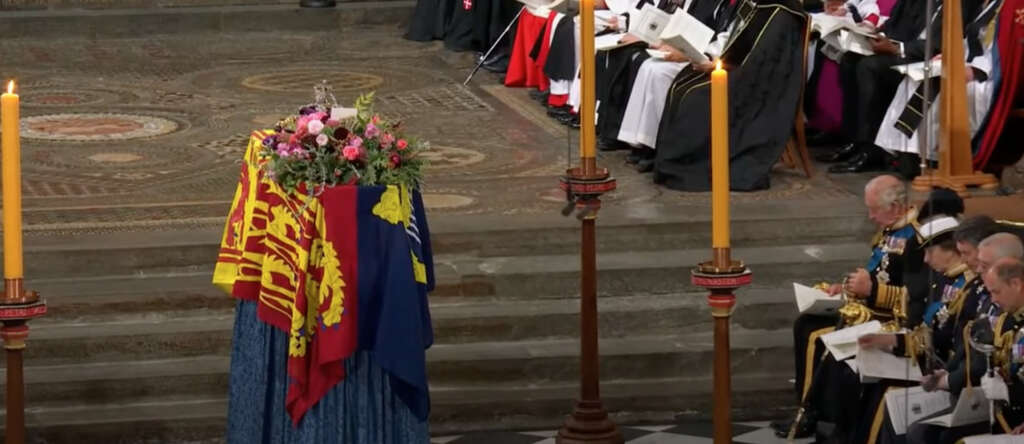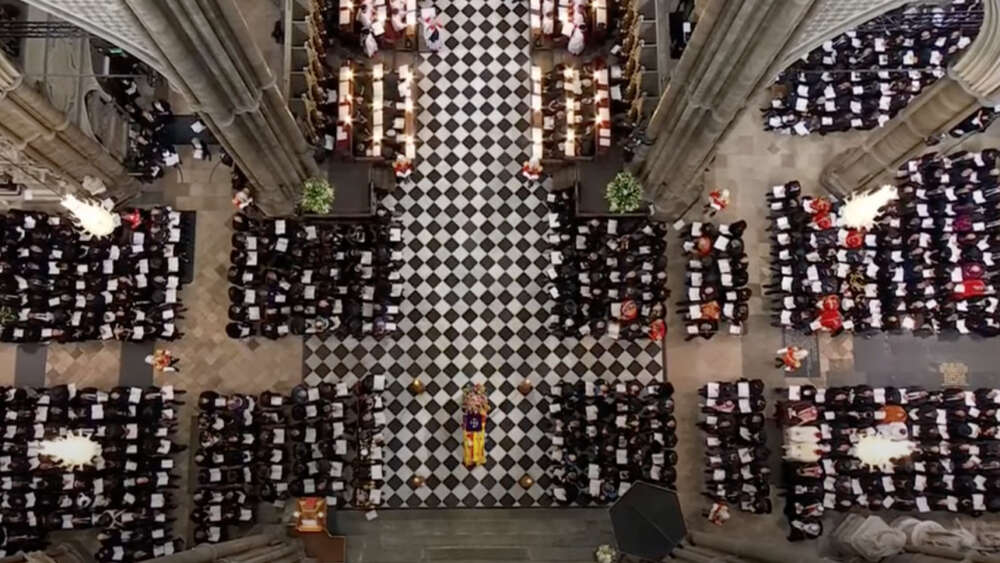One last magnificent porous day
Queen’s funeral a breathtaking acknowledgment of the reality of heaven above us, hell below us
For one brief day, the world was porous again.
For one brief day, we recognised that the invisible world still leaks into the visible.
For one brief day – perhaps one final day – transcendence was admitted into the public square in the modern Western world, and we all stood and acknowledged it.
For one brief day, the immanent frame of our secular imaginary was peeled back, and we were given a vision, albeit in shadow form, of what true majesty might look like.
And for one brief day the nation, indeed billions around the world, watched as a Queen, whose every fibre acknowledged that transcendence, was honoured and laid to rest.
And for an even briefer two minutes – the whole nation fell silent, and the shock waves of that silence spread to us as well. No phones, no blips, no bleeps, no pings. Silence.

Secretary-General of the Commonwealth, Baroness Patricia Scotland, from Dominica, reads 1 Corinthians 15 at the Queen’s funeral
In this final passive act, the Queen called us to acknowledge not our inner selves, or our felt selves, or our authentic selves, or whatever the latest psychobabble bon mot is that describes incurvatus in se, (the self curved in on itself) – but God Himself above.
Her commitment to transcendence – God’s transcendence – meant that down here she lived outwardly and upwardly. Archbishop Justin Welby acknowledged that very fact as he opened his homily, worth noting.
Her funeral was a breathtaking acknowledgment of the reality of heaven above us, hell below us.
I read in The Times just prior to the funeral that the word was that French President Emmanuel Macron would throw “a hissy fit” if he were not right up the front. Which of course makes sense coming from that most secular of countries in which the immanent frame is a public virtue. The desire for transcendence never leaves us; it is merely transferred. Perhaps he is aptly named Emmanuel.
Tony Blair’s senior adviser famously said that the British government doesn’t “do God. And my, how it has shown over the decades since.
Perhaps, if I may be patriotic, a special thank you to our new Prime Minister in Australia, Anthony Albanese, whose grace, wisdom and manner have been exemplary for our nation at this time. Not too heavy, not too light. Just right. But then again, as he himself said, the Catholic Church is one of the great shapers of his own life. He knows transcendence when he sees it.
The Queen, however, was the ultimate counter to all the immanent politics. Her funeral was a breathtaking acknowledgment of the reality of heaven above us, hell below us.
The fact that seating arrangements were such as to ensure warring nations were kept apart, and ancient enmities acknowledged, shows how porous reality is. Hell has leaked upwards. It may be around for some time yet.
And the whole ceremony was a counter to the dreadful opening ceremony of the Tokyo Olympics – the high point of immanence in our public life – in which John Lennon’s Imagine was the opening hymn. Right in the midst of a pandemic we were told to look within ourselves and be happy. Imagine that indeed.

The Archbishop of Canterbury Justin Welby preaches at the Queen’s funeral.
Imagine too if the Queen had died during the pandemic. We would have not witnessed what we did. Perhaps this was a gift from God to us, to give us one last look at something that publicly pointed to something – to Someone – beyond itself and beyond herself. Am I over-egging the cake? Perhaps, if you don’t believe that a transcendent God, who loves this most secular of times, is incapable of engineering it that way.
As a low churchman myself, whose church planting efforts have always begun in a household setting, there was a small ache for some visceral transcendent moment in church.
I know, I know, we walk by faith and not by sight, and we are convinced of the heavenly rule of Jesus because the Holy Spirit has been given to us from that porous heaven above, but still. It’s no wonder there’s a fatal rush to Rome from so many younger evangelicals.
When it’s almost a mantra that the only movement in church is horizontal (it’s only about serving other people), and never vertical, well you can see why people whose whole lives are stuck in the immanent frame Monday to Saturday, might just want a bit of transcendence.
A friend complained to me over private messaging (we were all on Facebook tracking each other’s responses weren’t we?) that he couldn’t make out a word of most of the songs. Perhaps that is no bad thing. I’ve been in enough church services where I wish I couldn’t.
So we listened. We listened hard to try and make out the words. A counter to the easy listening we have become accustomed to in church. The difference between a beef steak and a milkshake. We watched it in rapt attention.
The words are electrifying enough, but she delivered them not simply as an orator, but almost as a prophet.
The liturgy was amazing. I thought that in the circumstances (others demurred) that the Archbishop did a good job with the homily. But the real sermon, the absolute moment of the ceremony, was the word of God read from 1 Corinthians 15 by the Commonwealth Secretary-General, Patricia Scotland, from Dominica.

King Charles, Queen Consort Camilla, Princess Anne and Prince Edward face the Queen’s bedecked coffin.
The words are electrifying enough, but she delivered them not simply as an orator, but almost as a prophet. We were sitting there, going “Yes, yes, that’s it, that’s what I believe! That’s my hope”. God was speaking to us by his word as he promised he would. And if there’s ever an advertisement for the return of the public reading of The King James English version in church, that was it. And she didn’t start with “If you’ve got your device with you…”
But more importantly, 1 Corinthians 15 is what the Queen believed. For as I said, all of the pomp and ceremony around the Queen’s funeral was a reflection and anticipation of that great day when the last funeral in the world is ever conducted, when the last death has trundled off the grim production line and over the edge, and then Death itself is folded in upon itself.
All of the pomp and ceremony around the Queen’s funeral was a reflection and anticipation of that great day when the last funeral in the world is ever conducted
I have to confess I was done by the time the hearse laden with the Queen’s coffin was driving to Windsor for her interment. Sleep called.
And I awoke this morning, early, to get coffee. Committed as ever to the reality that we live in a porous world, one in which transcendence is a reality.
But also acknowledging that we witnessed the last public act in our world that acknowledged it. There will never be another public moment like it. The world awakens this morning to get on with the continued dismantling of such a framework. We will pick up again where we left off, with our Instagram, travel plans and whitegoods.
Our world will nestle deeper and deeper into immanence, while those of us who demur, will collectively steel our nerve and lift our eyes heavenwards from whence our hope comes, and reframe our lives before heading back out into the immanent frame. Or to put it another way – we will do keep doing church.
And we will understand that we turned out in our millions, and watched in our billions, to witness not only the burial of a queen, but the burial of a way of understanding this world that has stood the test of time for centuries – the laying to rest of a transcendent reality that the Queen not only represented, but that she witnessed to in the face of a rising tide of immanence.
And we wake to a world this morning in which the only alternative being offered to us is the ultimate sin, the celebration of incurvatus in se as the path to salvation. And that thought is unbearable.
Until we remember these words that enable us to wake another day and “do transcendence”.
…then shall be brought to pass the saying that is written, Death is swallowed up in victory. O death, where is thy sting? O grave, where is thy victory? The sting of death is sin; and the strength of sin is the law. But thanks be to God, which giveth us the victory through our Lord Jesus Christ.
Thanks be indeed. Lord, thank you for the life of the Queen, whose faith and trust in you spoke to us even louder in her death.
This article was first published on Steve McAlpine’s blog here.
Email This Story
Why not send this to a friend?


